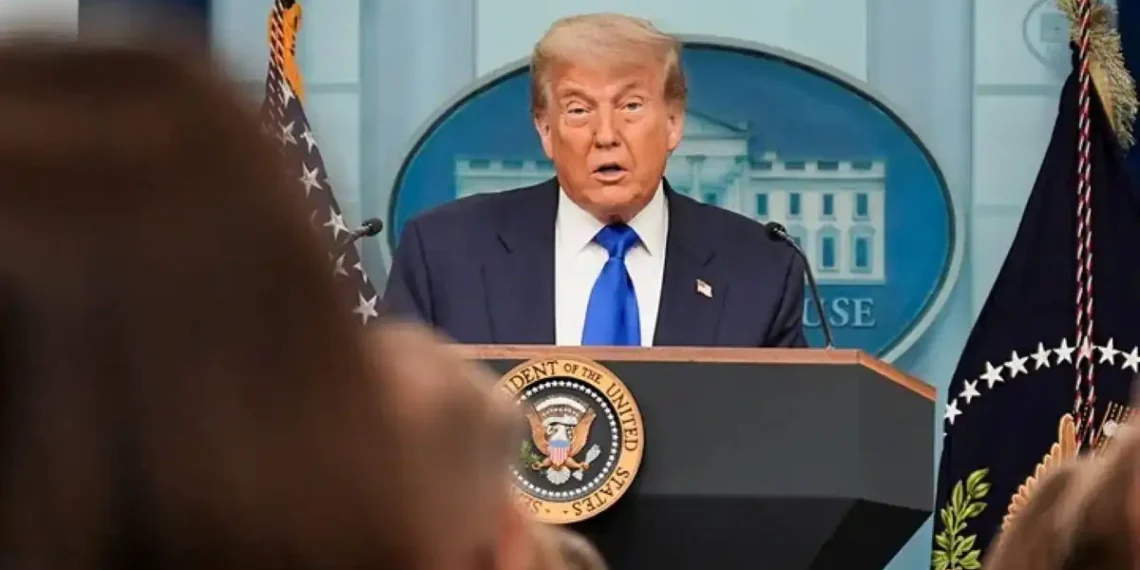Trump Applauds Supreme Court for Halting ‘Colossal Abuse of Power’ by Federal Judges
Former President Donald Trump wasted no time celebrating a major legal victory on Friday after the Supreme Court sharply limited the ability of lower federal courts to block presidential policies nationwide.
Speaking at a press conference just over an hour after the ruling was handed down, Trump praised the 6–3 decision as a blow to what he called the “colossal abuse of power” by what he described as a “handful of radical left judges.” These judges, he claimed, had repeatedly stepped in to obstruct policies he was elected to implement.
“I was elected on a historic mandate,” Trump said. “But in recent months, we’ve seen rogue judges try to override the will of the American people by blocking lawful executive orders nationwide. That ends today.”
Trump accused some district judges of trying to “dictate the law for the entire nation,” rather than rule narrowly on the specific plaintiffs before them.
The Supreme Court Ruling: A Shift in Judicial Power
The Supreme Court’s decision centered on the controversial practice of universal injunctions—court orders that block federal policies from taking effect across the entire country. The ruling doesn’t weigh in on the legality of Trump’s birthright citizenship executive order, which was at the heart of the case. Instead, the justices focused strictly on whether lower courts have the authority to issue such sweeping injunctions in the first place.
Writing for the conservative majority, Justice Amy Coney Barrett made it clear that lower courts overstepped:
“The issue before us is one of remedy,” Barrett wrote. “Whether, under the Judiciary Act of 1789, federal courts have equitable authority to issue universal injunctions. A universal injunction can be justified only as an exercise of equitable authority, yet Congress has granted federal courts no such power.”
Barrett also took aim at Justice Ketanji Brown Jackson’s dissent, arguing that Jackson’s position “decries an imperial Executive while embracing an imperial Judiciary.”
A Heated Dissent: Fears of Presidential Overreach
Justice Jackson, one of the court’s three liberal justices, issued a sharp dissent, warning that the ruling essentially grants the president unchecked authority—at least temporarily—by making it harder for federal courts to block potentially unconstitutional policies.
“This ruling creates an existential threat to the rule of law,” Jackson wrote. “It allows a president to violate the Constitution and escape judicial scrutiny unless every affected person files a lawsuit.”
Her concerns echoed those of other liberal justices, who have long warned that restricting universal injunctions could flood the courts with thousands of individual lawsuits and delay justice for people most affected by sweeping policies.
What Sparked the Case?
The case before the court involved three lower court judges—in Maryland, Massachusetts, and Washington state—who had issued nationwide blocks on Trump’s birthright citizenship order, a directive that would deny U.S. citizenship to children born on American soil to undocumented immigrants.
The Trump administration appealed, arguing that those injunctions were overly broad and beyond the legal scope of district judges.
While the Supreme Court sidestepped the core issue of whether the birthright order is constitutional, it instructed the lower courts to revise their injunctions to ensure they only apply to individual plaintiffs—not the entire country.
A Major Win for Trump’s Legal Strategy
Trump and his legal team see the decision as a green light to move forward with his agenda, without being repeatedly blocked by federal judges issuing nationwide bans from single courtrooms.
The ruling could dramatically change how legal challenges to presidential policies unfold going forward—not just for Trump, but for future presidents as well.
“This Supreme Court decision defends presidential authority and stops activist judges from grinding our country to a halt,” Trump said Friday.
This article was rewritten by JournosNews.com based on verified reporting from trusted sources. The content has been independently reviewed, fact-checked, and edited for accuracy, neutrality, tone, and global readability in accordance with Google News and AdSense standards.
All opinions, quotes, or statements from contributors, experts, or sourced organizations do not necessarily reflect the views of JournosNews.com. JournosNews.com maintains full editorial independence from any external funders, sponsors, or organizations.
Stay informed with JournosNews.com — your trusted source for verified global reporting and in-depth analysis. Follow us on Google News, BlueSky, and X for real-time updates.














